Superman: Mr. Terrific and James Gunn’s Approach to Black Characters
In Superman, James Gunn and Edi Gathegi do not reimagine Mr. Terrific. They restore him. It fits the pattern of how Gunn approaches his Black characters with nuance and complexity.
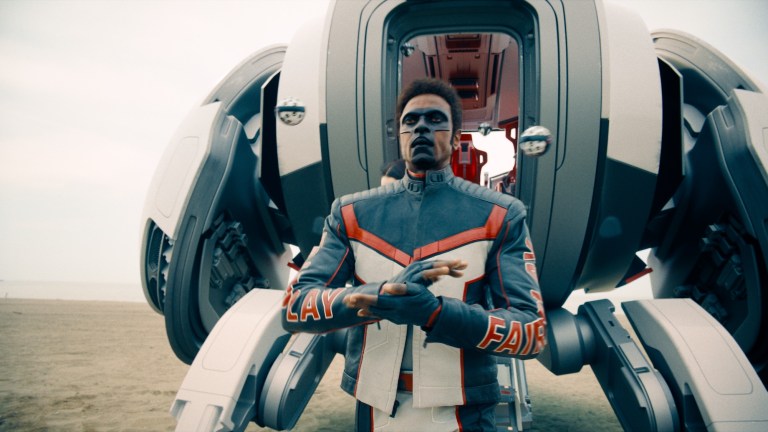
Michael Holt (Edi Gathegi), also known as Mr. Terrific, has long been one of the most brilliant, layered, and morally grounded characters in the DC Universe. He’s also been one of its most overlooked. For nearly three decades, live-action and animated adaptations have reduced him to comic relief, background support, or a footnote in someone else’s story.
Until now.
In Superman, James Gunn doesn’t reinvent Mr. Terrific. He restores him. From the moment Holt appears, he stands as an equal and peer, not a sidekick, to Superman himself. He commands the screen with quiet confidence, carries his intellect without arrogance, and moves with the emotional clarity rarely afforded to Black male characters in genre storytelling. He is shown as the total package: physical, strategic, principled, and emotionally intelligent. That’s not just a creative decision. It’s a pattern of character building that we’ve seen from Gunn before.
Mr. Terrific is the latest addition to a lineage of Black characters written by Gunn with intentionality, agency, and layered humanity. From the guarded vulnerability of Idris Elba’s Bloodsport to Leota Adebayo’s (Danielle Moore) ethical awakening, from the calculated control Viola Davis brought to a second outing with Amanda Waller to Clemson Murn’s (Chukwudi Iwuji) internal war, Gunn doesn’t flatten Blackness into a trope. He writes it carefully.
He proves, once again, that Black characters can be fully realized, emotionally complex, and narratively central. So it is that Gunn’s Superman doesn’t just introduce Mr. Terrific; it positions him exactly where he’s always belonged… at the center with his contemporaries.
Michael Holt: Reclaiming the Character from the Margins
Michael Holt made his debut in The Spectre #54 (1997), created by John Ostrander and Tom Mandrake. From the beginning, he stood apart. Not driven by revenge or destined for greatness, Holt was shaped by loss. After his wife and unborn child died in a car accident, he contemplated if his own life was worth living until science, discipline, and a deep care for humanity called him back. He earned over a dozen PhDs, became an Olympic gold medalist in the decathlon, and designed the T-spheres—sophisticated AI-driven technology capable of analysis, defense, surveillance, and other endless possibilities. He then joined the Justice Society of America not to fight for glory, but to serve with precision and empathy.
In the comics, Holt was always portrayed as a moral tactician trusted by gods, leaders, and even the Multiverse itself. Yet his onscreen appearances never truly reflected that. Justice League Unlimited reduced him to a background administrator. Arrow renamed him Curtis Holt and softened his edges into relief work. He became palatable, not powerful.
Gunn reverses all of that. His Mr. Terrific isn’t a footnote. He’s a force. Holt is introduced not with spectacle, but with extreme competence. He moves beside Superman, not behind him or subservient to him. He is shown as a fully formed physical, intellectual, principled, and emotionally grounded hero. It is the clearest articulation yet of the character’s original DNA.
And for actor Edi Gathegi, it’s more than a role. Mirroring Mr. Terrific’s newfound stardom, he gets his own reclamation. After his abrupt and underwritten exit as Darwin in X-Men: First Class, Gathegi finally gets a role built for longevity and layered with purpose. It lets both the actor and the character command the screen with quiet authority. An elite performer and elite hero converge in a space designed perfectly for them.
Presence as Power: Edi Gathegi’s Terrific Performance
Gathegi doesn’t overplay a single scene in Superman. His performance is quiet but exact. When Holt and Lois Lane infiltrate Lex Luthor’s off-grid blacksite, the brilliance of the character comes through, not depending on exposition, but in action. Holt calculates firing patterns, reprograms his T-spheres mid-combat, and shields Lois with clinical precision. Every movement is purposeful. There is no ego present. He embodies focus, calculation, and courage.
Gunn doesn’t frame Holt as comic relief or overcompensate with exaggerated strength or powersets. Instead Holt becomes the genre’s rarest creation—a Black hero allowed to be calm and lead with resolve. His silence speaks while his intellect pilots. His restraint is never mistaken for weakness. Even in scenes where other characters lean into chaos, Holt operates with clarity and thoughtfulness.
One of the film’s most meaningful choices is how Gunn handles Holt’s name. When Guy Gardner mocks “Mr. Terrific” as ridiculous, Holt doesn’t react. He doesn’t need to. His name is not a boast. It’s a claim and a self-affirmation. Gunn doesn’t treat it as a punchline. Over the course of the film, the name earns weight because Holt does. Where audiences and even the people inside of these universes have accepted the Superman moniker, Gunn strips away the last shred of unintentional goofiness from Mr. Terrific too. He makes more than just a title. It is an actualization of his being.
It is not the first time Gunn has sought to move past cliché and stereotypes while writing Black characters in the superhero space.
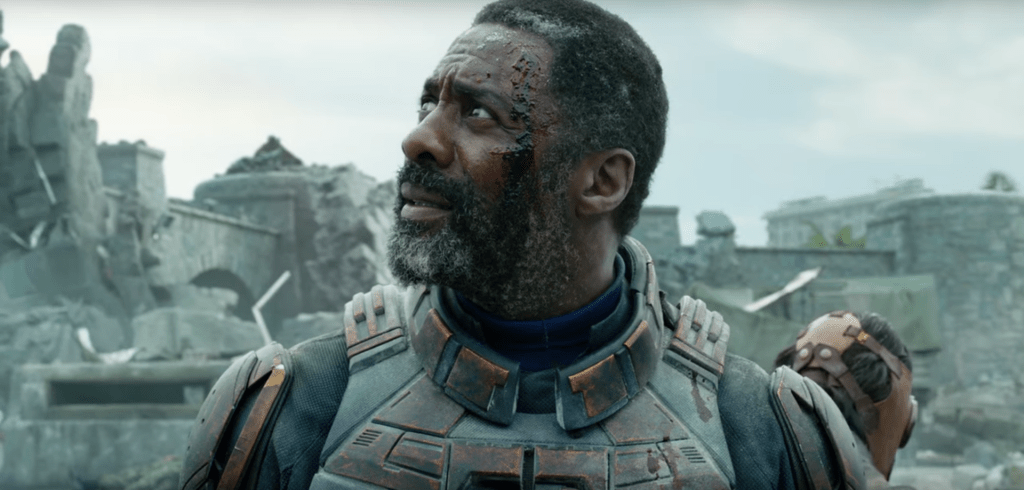
Bloodsport
At a glance Bloodsport (Idris Elba) might have looked like a spiritual successor to Deadshot (Will Smith) when his poster first dropped in The Suicide Squad, but the writing tells a different story. Deadshot in David Ayer’s Suicide Squad is charismatic, guilt-ridden, and gets a redemption arc centered on paternal love. Bloodsport in Gunn’s film, by contrast, is cold, angry, and emotionally blocked. He’s not a man reaching for redemption. He’s one trying not to drown in shame.
Gunn doesn’t smooth over that pain. Instead he lets it unfold slowly. When Bloodsport protects Ratcatcher 2 (Daniela Melchior), it’s not framed as nobility. It’s a fragmented attempt to do better than he did before. He’s not written to inspire. He’s written to be understood. That distinction matters. Gunn doesn’t elevate Bloodsport by stripping away his flaws. He lets those flaws breathe. The result is a man who earns our attention not by becoming perfect, but by staying present.
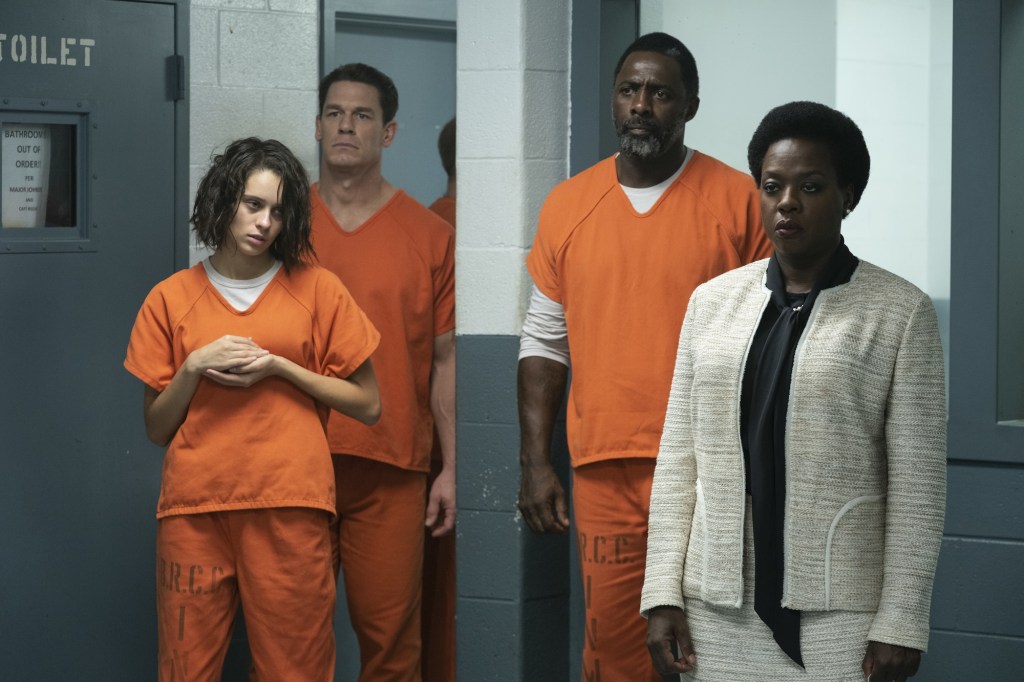
Amanda Waller
Viola Davis first played Amanda Waller in Ayer’s Suicide Squad where her character’s cold efficiency often got buried beneath tonal dissonance and narrative chaos. Gunn corrects her course by providing Davis a role that favors stillness, silence, and unflinching power. In both The Suicide Squad and Peacemaker, Waller is terrifying not because she acts violently but because she doesn’t have to do so. She is the system personified. She is calculating, bureaucratic, and completely detached from morality. She doesn’t believe in the world’s definition of honor.
Davis delivers one of the most controlled performances in the genre. She doesn’t need monologues. Her eyes, posture, and pauses do the talking. Gunn trusts that, and it pays off. In one of Peacemaker’s most devastating reveals, Waller uses her own daughter as a pawn in a government experiment. There’s no dramatic music or scream. There is only procedural betrayal placed in Davis’ hands to deliver just when maternal love feels like it could overcome structure.
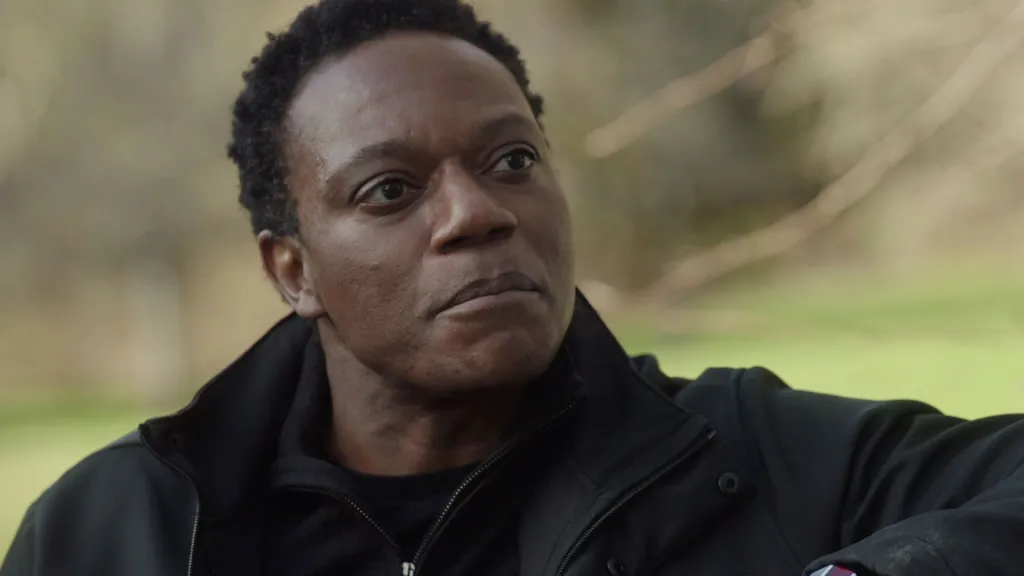
Clemson Murn
Clemson Murn (Chukwudi Iwuji) in Peacemaker is an alien parasite using the body of a former mercenary to try and save humanity from itself. It’s an absurd premise made intimate through Gunn’s writing. Murn is haunted, not just by the violence of his host, but by the limits of his own morality. He operates in secrecy, leads with calculation, and sacrifices comfort for purpose.
When he dies, there is no heroic swell or final speech. His death is quiet, full of irony, and grounded in a body never fully his own. Gunn doesn’t ask us to cheer and doesn’t write his character to evoke that emotion. He asks us to feel this moment. Murn is a contradiction made manifest, and that’s what makes him resonate.
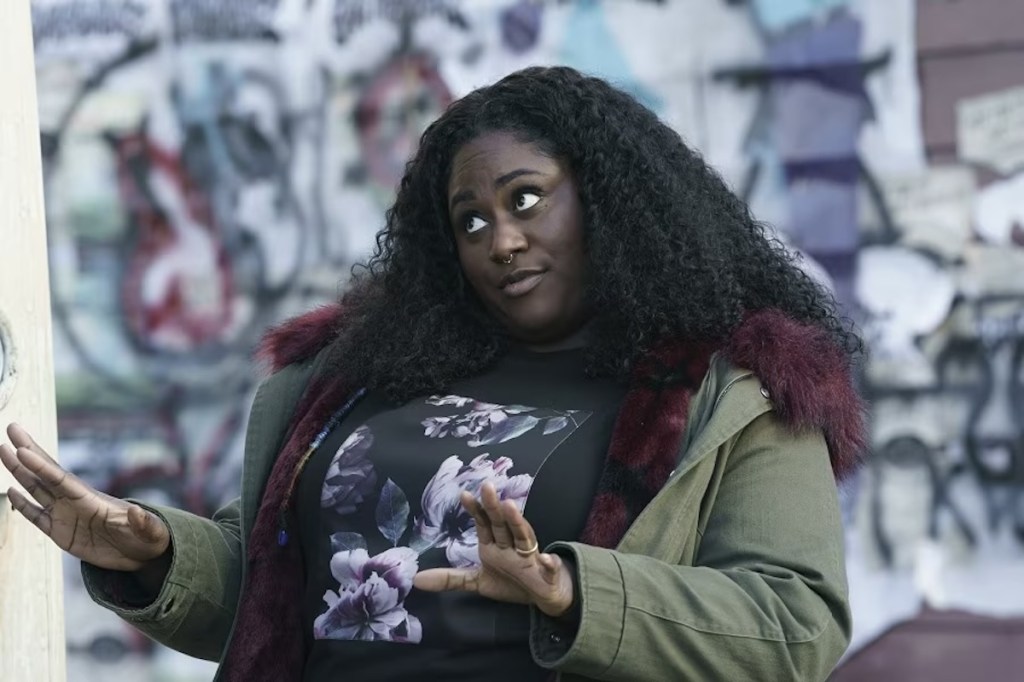
Leota Adebayo
Danielle Brooks’ Leota Adebayo is the moral compass of Peacemaker, and Gunn treats that compass with respect. She is not a trained assassin or hardened operative. She’s awkward, deeply empathetic, and learning as she goes. It doesn’t make her weak. It’s a sharp, intentional contrast to her mother, Amanda Waller. It makes her transformative and leaves us to question what real moral strength looks like.
She holistically rejects her mother’s inheritance. When she exposes Project Butterfly and her own mother’s corruption, her choice goes beyond just bravery. It’s a culmination of every choice she’s made to tell the truth, no matter the cost. Her softness isn’t shaped as something to overcome. It’s her light and the very trait that changes the people around her.
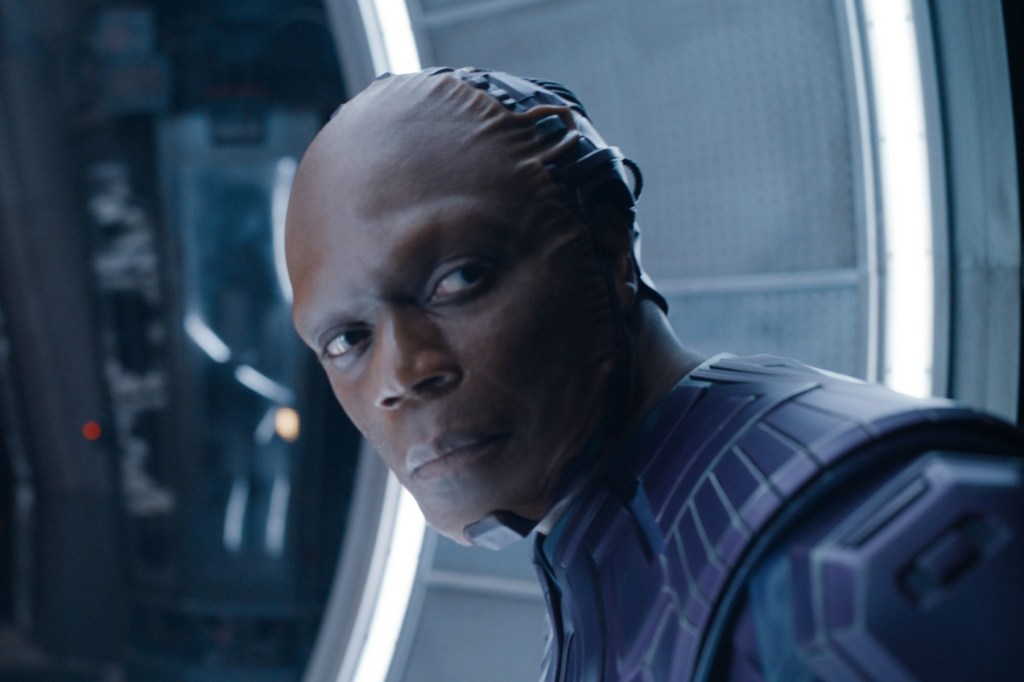
The High Evolutionary
In Guardians of the Galaxy Vol. 3, the High Evolutionary (Chukwudi Iwuji) is not misunderstood. He is monstrous. Where others may have tried to humanize him, Gunn goes the other way and reveals that some monsters are just monsters. The High Evolutionary experiments on sentient life, manipulates DNA, and abuses power under the guise of progress.
His obsession with perfection is cruel by nature, the real endpoint for perfectionism that goes untamed and isn’t guided by morality. Gunn lets the metaphor land. When Rocket tears off his face, the horror is literal and symbolic. Beneath the obsession with order lies disfigurement. It’s not subtle and it wasn’t meant to be. Gunn doesn’t let us look away. He makes us sit in the discomfort because it mirrors real-world cruelty that often hides behind the language of progress.
From Antiheroes to Apex, Gunn’s Blueprint Comes Full Circle
What connects Gunn’s portrayals of Bloodsport, Amanda Waller, Clemson Murn, Leota Adebayo, and the High Evolutionary is not just their shared identity. It is the way he writes them with full dimensionality. These characters are not reduced to tropes or symbolic placeholders. They are flawed, complex, emotionally grounded, and essential to the story. Gunn gives them contradictions that make them human and not just placeholders.
Still, these characters mostly live in the margins of morality. They are survivors, antagonists, antiheroes, and systems in conflict with themselves. Their stories matter, but they operate within tension and limitation.
They paved the way for Mr. Terrific, who is something else entirely.
He is not a villain, an antihero, or a cautionary figure. He is the culmination of Gunn’s idea of a Black superhero written with clarity, precision, and unwavering purpose. He sets a new standard of leadership and who can realistically be a vessel of it. Holt is peer to Superman in every sense. A fully realized superhero written without compromise, centered without spectacle, and portrayed with the emotional intelligence storytelling often neglects.
In a time when Black characters in media are still too often confined to trauma, tokenism, or moral compromise, Holt’s Mr. Terrific becomes an urgent reminder of who we’re allowed to be and believe in. He demands presence and proves that Black excellence doesn’t need translation, just recognition.
With Mr. Terrific, Gunn doesn’t offer a revision. He offers a restoration. One that affirms what should have always been possible.
